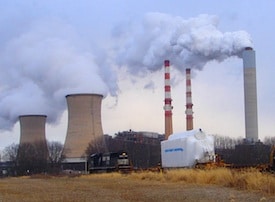The U.S. EPA has bowed to pressure from Republican members of Congress and relaxed the proposed rules for boiler emissions. By allowing utility industry companies to make “upgrades” to existing boilers, rather than replacing them with lower-emission boilers, corporations will save an estimated $1.5 billion in their attempts to meet emission standards.
The EPA claims that allowing companies to upgrade their existing equipment will still reduce emissions. The specific emissions being targeted are mercury and other toxic chemicals that are pumped out of oil refineries, chemical plants, and industrial plants.
The new, lower standards are the result of political attacks on EPA led by Republicans on Capitol Hill. Less than two months ago, Republicans in Congress unanimously voted to delay the EPA’s boiler ruling by another 15 months, as well as to give corporations 5 years to comply with the new standards. Only 41 Democrats voted in favor of delaying the rules, compared to 234 Republicans.
However, voting to delay the rules seems to go against the wishes of the American public, as majorities of both registered Democrats and Republicans were in favor of enforcing the emissions standards immediately.
So, if the public was for the rule, why did Congress vote to delay it? According to noted climate change denier Senator James Inhofe:
“After a string of delays, EPA has officially re-proposed Boiler MACT – a rule that when first proposed, would have forced the closure of numerous manufacturing plants across the country and destroyed up to 800,000 jobs. While I appreciate that EPA has acknowledged Boiler MACT’s devastating economic effects and revised the rule, today’s proposed standards are still largely unachievable, putting thousands of jobs at risk and undermining America’s competitive position in the world marketplace. A legislative fix is clearly needed.
Fortunately, there is a strong bipartisan majority in the House and Senate that supports stopping EPA’s Boiler MACT rule: Bipartisan legislation has passed in the House with 41 Democrats supporting the bill, and 12 Democrats are cosponsors of a bill that has been introduced in the Senate.”
So, Inhofe’s problem with the rule is that it would destroy jobs and our economy. Unfortunately for Inhofe, the facts tell a different story.
Earlier this year, a report came out telling us that full enforcement of the Clean Air Act, the act under which the boiler rule would be implemented, would create an estimated 1.5 million American jobs, almost twice as many jobs as would be “destroyed” according to Inhofe, resulting in a net gain of 700,000 jobs.
On top of that, studies show that every dollar spent on complying with Clean Air Act specifications leads to between $4 and $8 of economic benefits. Those dollars also add up quickly in health benefits, as every dollar spent on Clean Air Act compliance generates a $12 to $30 savings in health costs for Americans.
Not only would it save us money, according to Bloomberg, those boiler rules could have saved lives:
The EPA has said that, in addition to creating jobs, the regulation would improve public health by limiting toxins that people breathe. The rule may prevent as many as 6,500 deaths a year, according to the administration. The boiler standards are meant to help protect Americans from cancer, heart disease and asthma.
To sum this up, the EPA rules would have created more American jobs, saved us money on healthcare, stimulated the economy, and saved American lives.
So why have the rules been delayed? As we’ve pointed out numerous times in the past, this is simply a continuation of the ongoing GOP attack on the EPA. The polluter-friendly GOP has already warned us that the entire agency could be on the chopping block if Republicans take back the White House in next year’s elections, and current GOP favorite Newt Gingrich has called the EPA “a job-killing regulatory engine of higher energy prices.”
Americans are less than a year away from a presidential election – an election that is becoming increasingly significant with regards to the future of environmental protection. Voters have been informed by the GOP candidates themselves as to what they will do if elected into office – abolish or severely weaken the EPA. So the excuse of “I didn’t know” will not be sufficient if important agencies like the EPA are hobbled, and it will be American voters who suffer the economic and health impacts of the Republican war on the environment. A lot is riding on this election, and the future of clean air protections – not to mention gauranteed failure to combat climate change – hang in the balance.
Subscribe to our newsletter
Stay up to date with DeSmog news and alerts







